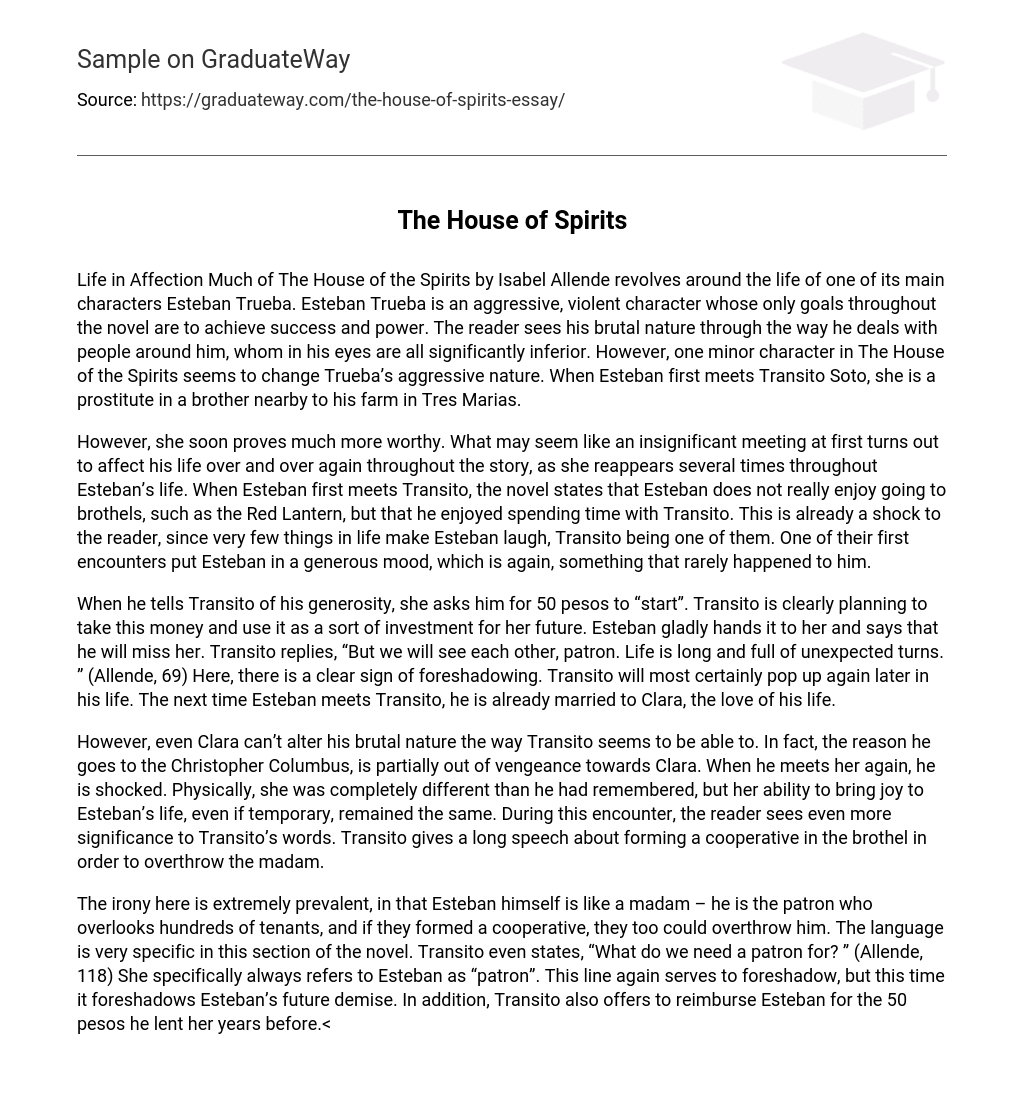The House of the Spirits, written by Isabel Allende, focuses on the life of Esteban Trueba, one of its main characters. Trueba is portrayed as an aggressive and violent individual whose sole ambitions in the novel are success and power. The author portrays his brutality through his interactions with those he perceives as inferior. Nevertheless, one minor character, Transito Soto, seems to have a transformative effect on Trueba’s aggressive demeanor. Initially, Trueba encounters Soto as a prostitute living in a brothel near his farm in Tres Marias.
Despite initially appearing insignificant, the meeting between Esteban and Transito greatly impacts his life multiple times throughout the story. She reappears several times, becoming a notable figure in Esteban’s life. The novel highlights that Esteban does not particularly enjoy visiting brothels like the Red Lantern, but he finds enjoyment in spending time with Transito. This surprises the reader, as Esteban rarely finds things in life that make him laugh – Transito being an exception. One of their first encounters impresses Esteban, putting him in a generous mood – a rare occurrence for him.
When Transito learns about his generosity, she requests 50 pesos as a starting amount. It is clear that Transito intends to use this money as an investment for her future. Esteban willingly gives her the money and expresses his feelings of missing her. In response, Transito says, “But we will see each other, patron. Life is long and full of unexpected turns.” (Allende, 69) This foreshadows that Transito will reappear in Esteban’s life later on. The next encounter between Esteban and Transito takes place after he has already married Clara, the love of his life.
However, Clara cannot change his cruel nature as effectively as Transito can. In fact, he decides to visit the Christopher Columbus partially to get back at Clara. When they meet again, he is surprised. Although she looks different than he remembers, she still brings happiness to Esteban’s life, even if it is only temporary. This encounter further highlights the importance of Transito’s words. Transito gives a lengthy speech about establishing a cooperative in the brothel to overthrow the madam.
The irony is evident in this passage, as Esteban is compared to a madam who oversees numerous tenants. If the tenants were to unite, they could overthrow him. The language used in this section of the novel is very precise. Transito even questions the need for a patron, referring to Esteban as “patron” consistently. This line further hints at Esteban’s eventual downfall. Furthermore, Transito offers to repay the 50 pesos that Esteban had lent her years ago.
In the text, the foreshadowing of future encounters is evident when he only asks her for a favor. This is followed by him mentioning an important role in his life that Transito Soto played later on. All the previous meetings and exchanges of words and favors have led up to this final reunion, which would have a permanent impact on Esteban’s life.
Transito has always been a source of happiness for Esteban, appearing whenever he needed it. However, their final encounter would change his life forever. Transito now owns a large hotel, fulfilling everything she had promised. This parallel between Transito’s rise and Esteban’s decline is evident. As their power dynamic shifts when they meet, Esteban asks Transito to help him find his kidnapped granddaughter Alba, taken by his grandson Esteban Garcia.
Transito Soto is updated by Esteban about his life since their last meeting and he implores her to locate his only granddaughter, so he can bring her back safely. She fulfills his request as Esteban acknowledges her accomplishment by stating, “Transito Soto has achieved her current position due in part to her ability to repay debts. I assume she utilized her knowledge of influential individuals to reimburse the 50 pesos I once lent her.” (Allende, 421) Transito Soto’s character represents various stages in Esteban’s life. Their initial encounter occurs when Esteban is embarking on his journey in Tres Marias.
He finds himself directionless and alone, with no support. When he encounters her at the Christopher Columbus, he is at the pinnacle of his financial and marital triumph. Clara, the woman he loves deeply, is pregnant with twin sons, he is among the wealthiest individuals in the vicinity, and lives the life he always desired. It is during this phase of his existence that his downfall commences. Transito Soto gains influence as the brothel’s madam is overthrown, and she initiates her own enterprise. At the novel’s conclusion, Esteban is left with only his granddaughter; his declining mental state is reflected in his deteriorating physical appearance as an old man who has withered away.
The novel illustrates a significant trade-off in power between Esteban and Transito, encompassing social and financial aspects. This trade-off serves a greater purpose by also depicting a shift in power from men to women. Despite Esteban’s belief in his control, it becomes evident that women in the family always had the upper hand. As the story progresses, Esteban eventually comprehends that he did not lead the life he desired, but rather one characterized by bitterness and violence. Throughout the novel, Transito emerges as a clear symbol of Esteban’s downfall and the power that women possess, even when it may not be noticeable to the men around them.





